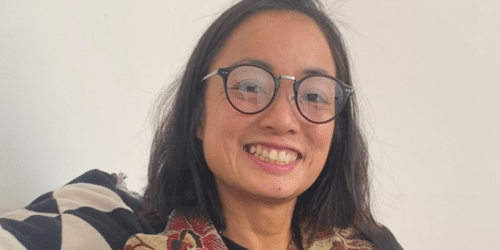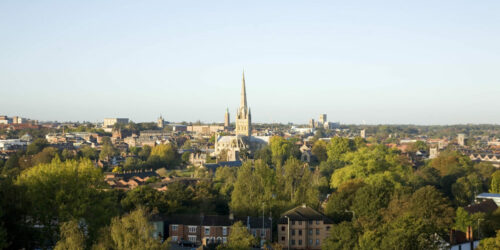
Discover NCW resident and translator Gabriela’s stay in Norwich, her search for meaning while translating contemporary Bulgarian poetry, and how Strangers Hall helps to provide some of those answers.
I have experienced it before—the lure of traveling to a new and exciting place that promises the elusive sensations of liberation, contentment, and triumph. I’m no stranger to this feeling, nor am I a stranger to the trepidation and the myriad of questions encompassing a journey you take on your own.
Initially, I was frightened—how does one navigate the role of a complete stranger in an utterly unfamiliar environment? Fortunately, Norwich welcomed my presence, allowing me to comfortably embrace my outsider status. I felt enchanted, as if walking in a dream, observing the city’s folk, their lives, and experiences, and in rare moments of courage—even talking to them.
The encounters with the lovely locals unveiled a universal truth: people everywhere had similar trials and tribulations—the search for identity, meaning, and the fear of being misunderstood. This gave me confidence that the only thing I had to be true to in translating was the innate soul of the text, that is, of the person who wrote it. And to find that soul, reflecting on my own experiences proved immeasurably valuable.
My residency project involved translating contemporary Bulgarian poetry into English, a task burdened with unfamiliarity and prompting recurring self-doubt. I often asked myself if I was brave enough to translate into a non-native language. Fear of failure, my loyal companion, begged to ask: what if I was an impostor? What if I could not render the pursuits of the Bulgarian soul into English? What if my project was insignificant, meaningless? What if I failed to grasp the true essence of a poem? What if my native language resisted my urge to render it in English? And most importantly, was there a definite, correct way to translate a poem?
For me, the answer(s) lay in Strangers’ Hall. This excellent museum shows us the life of the Dutch, Walloon, and Flemish families who had been invited to the city to introduce new weaving methods but also sought refuge as they had been persecuted based on their religion during the 16th century. It lets us peek into the rooms of the life of a family of Strangers that lived here many years ago. It may sound odd, but what impressed me most was the house’s numerous stairs. So many were they that, as the lovely guide shared with us, the family’s children could each go to their respective chambers using a separate staircase! And whichever one the visitors chose, there was always a hidden corner or an obscured nook that had eluded their gaze. This little piece of information remains with me still, and I now believe it is an eloquent metaphor embodying my translation residency experience.
Because, much like the various staircases at Strangers’ Hall, each path I took ultimately led me to where I was supposed to be. Even in moments of uncertainty when I felt adrift or disconnected, I gradually appreciated that meaning could be discovered in unexpected places.
While seeking the best way to render a metaphor or a Bulgarian notion in English, I often fell into a spiral of trying to unveil its profound meaning. Sometimes, the spiral included talking to the author, scrutinizing a particular poem’s paratext, exploring other texts entirely, or engaging in political discussions with my lovely roommate Dragana. The most extraordinary epiphanies occurred to me at the most peculiar times—for instance, while eating falafel at the Market, carrying my groceries from Morrisons, or people-watching at the Plantation Gardens. Even though I sometimes felt I was straying off my path by doing things seemingly unrelated to translation, it finally dawned on me that the time we spend not translating is equally momentous as the time invested in translating. And if you’re fortunate, sometimes life and translation intertwine, and you find yourself precisely where you’re supposed to be.
 Gabriela Manova is a writer, translator, and editor born and raised in Sofia, Bulgaria. She holds a bachelor’s degree in Book Publishing and a master’s in Translation. She has worked as an editor and translator of fiction and non-fiction books. Her debut poetry collection was published in 2020. Some of her poems, articles, and translations have been featured in various print and digital editions.
Gabriela Manova is a writer, translator, and editor born and raised in Sofia, Bulgaria. She holds a bachelor’s degree in Book Publishing and a master’s in Translation. She has worked as an editor and translator of fiction and non-fiction books. Her debut poetry collection was published in 2020. Some of her poems, articles, and translations have been featured in various print and digital editions.
During her residency, she hopes to work on creating an anthology of contemporary Bulgarian poetry translated into English. She believes such a project would have a cultural significance and help represent the exceptionality of contemporary Bulgarian poetry to readers worldwide. Image © Yana Lozeva
This residency was in partnership with the Elizabeth Kostova Foundation.
Header image © Strangers Hall Norwich by Ashley Dace, CC BY-SA 2.0
You may also like...
‘Running (Haphazardly Around) Norwich’ by Meihan Boey
NCW resident and author Meihan Boey describes her time staying in Norwich, providing a warm, humorous take on a run that has a story all its own to tell.

3rd August 2023
Translating Tagore in Norwich
‘The timekeepers of this city have perhaps witnessed a passer-by cosplaying as a poet before.’

15th June 2022






